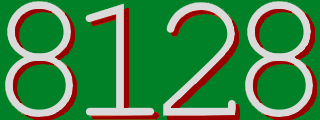8128
this perfect left to right colour shift in hex-code goes from #008128 to #812800
yes, nobody is perfect indeed, but numbers can be, namely: 6, 28, 496, 8128, 33550336, ...
definition of a perfect number: sum of all its divisors gives the number itself
8128 = 1+2+4+8+16+32+64+127+254+508+1016+2032+4064
it is supposed that all perfect numbers are even
then, for n > 6, all perfect numbers are
the sum of odd cubes:
28 = 1^3 + 3^3
496 = 1^3 + 3^3 + 5^3 + 7^3
8128 = 1^3 + 3^3 + 5^3 + 7^3 + 9^3 + 11^3 + 13^3 + 15^3
.....
and they can be written as
n = 1 + 9*k*(k+1)/2 , k = 8j+2, j not negative integer
28 = 1 + 9*2*(2+1)/2 (j=0)
496 = 1 + 9*10*11/2 (j=1)
8128 = 1 + 9*42*43/2 (j=5)
.....
and all as sum of first natural numbers
6 = 1+2+3
28 = 1+2+3+4+5+6+7
496 = 1+2+3+4+5+6+7+8+ ... +31
8128 = 1+2+3+4+5+6+7+8+ ... +127
.....
which is the same as
6 = 3*4/2
28 = 7*8/2
496 = 31*32/2
8128 = 127*128/2
.....
already Euclid knew this formula:
6 = 2^1*(2^2-1)
28 = 2^2*(2^3-1)
496 = 2^4*(2^5-1)
8128 = 2^6*(2^7-1)
in general (proved in 1644 by Marin Mersenne):
perfect number = 2^(n-1) * (2^n -1), where (2^n -1) is prime,
reciprocals of all divisors of a perfect number n (including n) added gives 2, in case of
8128: 1/1+1/2+1/4+1/8+1/16+1/32+1/64+1/127+1/254+1/508+1/1016+1/2032+1/4064+1/8128 = 2
all perfect numbers end with 6 or 8
their prime factorization has the form 2^i x p, p = 2^(i+1) - 1
the binary code starts with k ones, followed by (k-1) zeros
first 7 perfect numbers (binary):
•110
•11100
•111110000
•1111111000000
•1111111111111000000000000
•111111111111111110000000000000000
•1111111111111111111111111111111000000000000000000000000000000
first 11 perfect numbers (decimal, note line break for long numbers on small screens!):
• 6 •
• 28 •
• 496 •
• 8 128 •
• 33 550 336 •
• 8 589 869 056 •
• 137 438 691 328 •
• 2 305 843 008 139 952 128 •
• 2 658 455 991 569 831 744 654 692 615 953 842 176 •
• 191 561 942 608 236 107 294 793 378 084 303 638 130 997 321 548 169 216 •
• 13 164 036 458 569 648 337 239 753 460 458 722 910 223 472 318 386 943 117 783 728 128 •
furthermore:
8128 Nicomachus is the name of asteroid 1967JP,
in honor of Nicomachus*of Gerasa,
Jordan, who lived between 60 and 120 A.D. and who has been credited with the discovery of
8128 to be the fourth perfect number. He was an arithmetician, philosopher and music theoretician.
The asteroid (15 km diameter) was discovered 1967 by Argentinian astronomer Carlos Ulrrico Cesco, the name
8128 Nicomachus was suggested by astronomer B.G. Marsden and is official since 1998.
8128 is part number of LEGO Cad Bane’s Speeder ( Star Wars :-) and of many other products ...
more interesting 4-digit numbers:
more about artful numbers and their beautiful arithmetic: artmetic
→
top of page / home
( as a born perfectionist,
I love perfect numbers too,
clever ciphers, things and thoughts -
cryptic puns - and such - as well ;- )
* email:
nicomachus@8128.info

